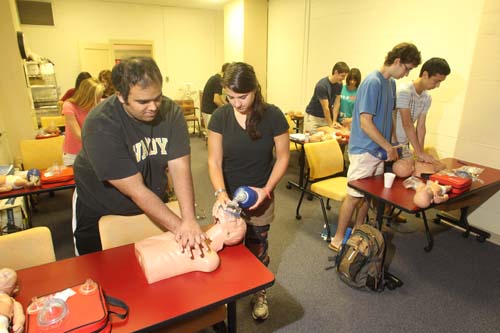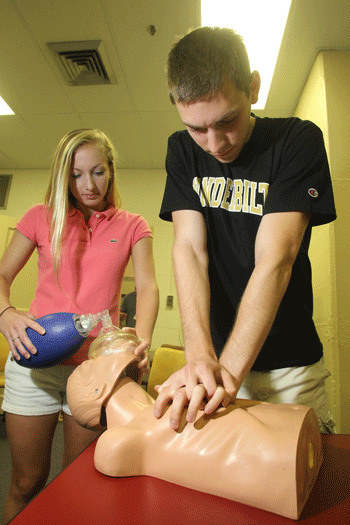VEMS puts undergrads on the front lines of medicine

“I found myself asking questions to anyone who would answer and wanting to understand everything that was going on,” he said.
When he returned to Nashville in the fall, he signed up for a First Responder course offered by the Vanderbilt Emergency Medical Society, a group aimed at providing undergraduate students with emergency medical training and firsthand clinical experience. While these are a fundamental part of the medical school experience, “[rquote]It’s hard to get a real clinical opportunity as an undergraduate,” said Meyers, now a senior majoring in engineering science.[/rquote]
VEMS was founded in 2007 by then-undergrad Christian Renne. Now, more than 50 students are on the VEMS roster, having qualified for membership by earning their First Responder certificate or by participating in an EMT-IV reciprocity program through the organization.
The First Responder certification is a 60-hour, semester-long course that equips students with the foundational knowledge and skills they need to provide pre-hospital care in a variety of situations. The Emergency Medical Technician-IV course is a Tennessee-specific certification that involves more advanced skills, such as intravenous access and advanced airway management. VEMS offers the EMT-IV as a 40-hour reciprocity class that enables students already certified as EMTs in their home states to become certified in Tennessee.
These courses are typically offered once per year and carry no academic credit, yet interest is high among Vanderbilt students, with VEMS routinely having to turn people away. “Last year we got upward of 60 applicants for the First Responder course, but we had to cap the class at 25 because that’s the state requirement,” explained Meyers, who is serving as president of VEMS this year.
Active VEMS members use their training to volunteer at Nashville’s Siloam Family Health Center and Faith Family Medical Clinic, where they take patient histories, record vital signs, consult with primary care physicians and assist with procedures. EMT-IVs also can administer flu shots and start IVs.
Students also volunteer with the Davidson County Rescue Squad by providing emergency medical services alongside paramedics at community gatherings, such as sports events and concerts. In cooperation with the Nashville Fire Department, VEMS members participate in ride-alongs to observe ambulance crews as they respond to emergency calls. And VEMS offers monthly continuing education meetings for its members to discuss current medical topics and procedures.

While VEMS has actively served the Nashville community over the last five years, it now seeks to serve the Vanderbilt campus more directly. Beginning this fall, VEMS members are teaching a free CPR/AED/Heimlich certification class each week at The Martha Rivers Ingram Commons in cooperation with the Vanderbilt Resuscitation Program. Cardiopulmonary resuscitation, automated external defibrillation and the Heimlich maneuver are life-saving skills that form the backbone of emergency medical care, and VEMS wants as many students, faculty and staff members as possible to learn them.
According to the American Heart Association, emergency medical services treat nearly 300,000 people for out-of-hospital cardiac arrest in the U.S. each year, but less than 8 percent survive. CPR given immediately can double or triple a victim’s chance of survival, but less than one-third of out-of-hospital cardiac arrest victims receive bystander care.
For VEMS member Kristen Cattoi, teaching CPR is a personal crusade.When Cattoi was 5 years old, she suddenly stopped breathing. A bad bout of pneumonia combined with croup had compromised her airway, and one day at home, she began to choke. Her father rushed her to the house of a nearby neighbor, a doctor, who guided him in performing CPR on Cattoi, saving her life.
The event inspired Cattoi’s parents to organize a CPR program at her elementary school, where more than 200 people learned the procedure. Cattoi says at least one of them later used CPR to save a life.
“[rquote]If training 200 people saved at least one life, then I think we can do a lot better at Vanderbilt. There are so many opportunities to train such a diverse group of people here, who knows what sorts of situations they may find themselves in?”[/rquote] asked Cattoi, a senior molecular and cellular biology major.
Each weekly class of two VEMS instructors and 12 participants will be three hours long and earn AHA certification upon completion. VEMS also offers small- and large-group classes for students upon request, and large-scale training sessions for campus organizations. VEMS is working with The Ingram Commons leadership to promote the classes to first-year students in particular.
“Our five-year goal for this program is to train all incoming first-years in CPR,” Cattoi said. “Whether they think they need to know CPR or not, someday they might have to, and we’ll at least have given them the opportunity.”
This kind of preparedness gets to the heart of what VEMS is all about.
“Like many undergraduates I had a vague idea that I liked medicine, but until you get some one-on-one patient contact, you have no idea what you’re in for,” Meyers said.
“I think VEMS is a unique opportunity for undergraduates because it provides them with that firsthand, genuine clinical exposure,” he said. “In doing so, I hope VEMS can help students discover their passion for medicine in the same way it helped me.